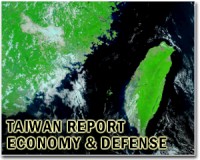 |
Taoyuan, Taiwan (AFP) March 31, 2010 Taiwan and China held a new round of talks on a contentious trade pact Wednesday as protesters wary of the island's closer ties with the mainland scuffled with police and rival demonstrators. A group of about 100 anti-China demonstrators gathered as representatives of the two sides met in a hotel in Taoyuan near the island's capital, but were kept back by a cordon of uniformed police. "We should protect Taiwan's sovereignty and Taiwan's own future," said Chang Jaw-liang, one of the protest organisers. "Taiwan should not lean towards China." One woman set a Chinese flag ablaze, while scores of protesters holding placards opposing "unification" briefly clashed with pro-China supporters before police separated them. The two-day Taoyuan meeting is the second round of formal talks on the planned pact and will focus on drawing up a list of industries entitled to preferential tariff treatment as soon as the agreement comes into force. The pact, known as the Economic Cooperation Framework Agreement, has set off a great deal of debate in Taiwan, which has governed itself since 1949. In Beijing, the Cabinet-level Taiwan Affairs Office called for solving areas of disagreement through dialogue. "People of different opinions should improve their understanding and solve disputes through rational and reasonable communication rather than resorting to drastic methods," said spokesman Yang Yi. Taiwan's Beijing-friendly government wants to sign the pact as soon as possible, arguing it will boost growth and employment, but opponents fear it will erode the island's de facto independence from the mainland. "ECFA is not a cure-all, and it's not a monster," said Tang Wei, the head of the Chinese delegation and a senior official with the mainland's commerce ministry. The leader of the Taiwanese delegation, Huang Chih-peng, noted that farmers and workers in low-technology industries were concerned about the consequences of the agreement. "We should try to take into account all the different opinions and ease their concerns," said Huang, who is also the director general of Taiwan's Bureau of Foreign Trade. The director of China's Taiwan Affairs Office Wang Yi said the ECFA would not affect the island's "vulnerable" industries or labourers, in an interview with a Taipei-based newspaper. "The mainland will try to select products that will benefit Taiwan's medium- and small-sized companies and local residents when it comes to tax reduction as part of an early harvest program," he told the Want Daily. He also said that China does not intend to export labour to Taiwan and will not require the island to increase its imports of agricultural products from the mainland, he said. Taiwan and China have been split since the end of a civil war six decades ago, but Beijing considers the island part of its territory and has vowed to get it back, by force if necessary.
Share This Article With Planet Earth
Related Links Taiwan News at SinoDaily.com
 US leaves open more arms for Taiwan
US leaves open more arms for TaiwanWashington (AFP) March 18, 2010 The United States on Thursday left open the possibility of further arms sales to Taiwan, with a senior official saying that China's military buildup was aimed squarely at the self-governing island. President Barack Obama's administration in January approved a 6.4 billion dollar arms package for Taiwan including helicopters, Patriot missiles and mine-hunting ships, angering Beijing. State ... read more |
|
| The content herein, unless otherwise known to be public domain, are Copyright 1995-2010 - SpaceDaily. AFP and UPI Wire Stories are copyright Agence France-Presse and United Press International. ESA Portal Reports are copyright European Space Agency. All NASA sourced material is public domain. Additional copyrights may apply in whole or part to other bona fide parties. Advertising does not imply endorsement,agreement or approval of any opinions, statements or information provided by SpaceDaily on any Web page published or hosted by SpaceDaily. Privacy Statement |